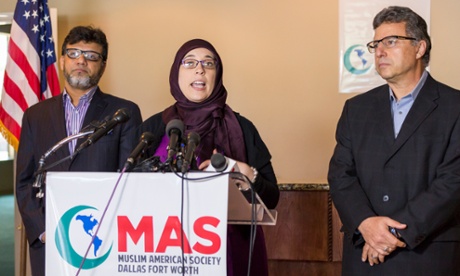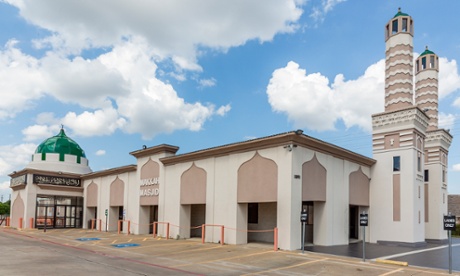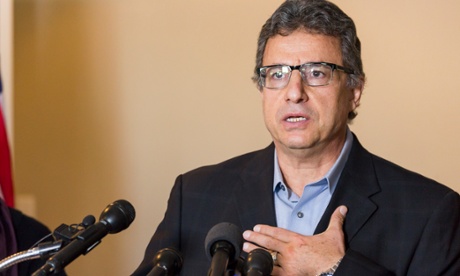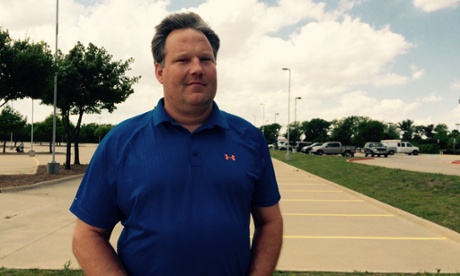
Pamela Geller is not from Garland, Texas.
Neither is Geert Wilders, nor the two gunmen who showed up at the Curtis Culwell Center on Sunday night with intent to hurt – or worse. A sizeable portion of the attendees at the “draw the prophet” contest had also come in from out of town.
Early on Sunday evening, a dark sedan drove up to the indoor arena where 200 people were attending the event featuring caricatures of the prophet Mohammad. The evening had been organized by Geller’s group, the American Freedom Defense Initiative (AFDI). Two men – since identified as 30-year-old Elton Simpson and his roommate Nadir Soofi, of Phoenix, Arizona – jumped out of their car wearing body armor and opened fire with assault rifles at a police car standing guard. The duo shot one security guard in the leg before a police officer on duty shot and killed both men. Their bodies lay on the ground until the following late morning.
Islamic State has since taken credit for the amateur attack, but it is unclear what relationship – if any – the two gunmen had with the group.
Residents of this Dallas suburb are hurt and angry that outsiders have been allowed to come in and leave an indelible and distressing mark on their city.
“I think the most disturbing thing is that both the organizers of the event and the perpetrators of the crime are outsiders,” Alia Salem, the executive director of the local chapter of the Council on American-Islamic Relations (CAIR), told the Guardian.
“Both entities approached Dallas, Texas, with hatred in their hearts,” she said, of the AFDI and the perpetrators of the brazen attack, that had shaken her community “and brought turmoil and fear into our midst”.
Garland’s mayor also rejected associations between his city and the event itself.
“This [event] does not involve Garland,” Mayor Douglas Athas said on Monday. “Garland was not participating in this as a city in any way.”
This was a sentiment echoed by several other residents and business owners in the area, who felt let down by the officials who allowed this event to take place.
“I’m angry that they allowed this group to hold their event here,” said Kelli Sinquefield, 49, a longtime Garland resident. “They were obviously trying to incite.”
Garland, a city of roughly 235,000 people, has a sizable Muslim population. Though estimates vary, the number of Muslims in north Texas is at least 100,000. The area was recently deemed the fifth most diverse neighborhood in the country, according to city’s mayor.

According to Khalid Hamideh, a longtime community member whose law offices had been in Garland for 17 years until recently, said that local Muslim families were on edge about possible retaliation for the incident.
“Sometimes, when something like this happens, sometimes our schools and our mosques become a target,” he said. “They get bomb threats.” Hamideh said that many families on Monday did not send their children to Islamic schools for fear of retribution.
“We haven’t done wrong, nothing. But the fear exists.”
Hamideh spoke at a press conference held by local Muslim leaders, who said that it was this precise fear of danger to their community that led them to speak out and condemn the attacks, even though they were not responsible for them.
That local Muslims felt compelled to publicly condemn an attack which had nothing to do with them is symptomatic of public life for many US Muslims since 9/11. Several times throughout the press conference, the three leaders reiterated that the majority of the world’s Muslims were peaceful, and that extremists did not speak in their names.
Attendees of Geller’s event did not seem to agree. In several interviews conducted with Texans who had attended the inflammatory event, phrases such as “Islam is the devil” and “Muslims do not belong in Texas” were bandied about with ease.
Though Muslims have been in Garland and the north Texas region for decades and, according to community leaders, have enjoyed largely positive relationships with their neighbors, the visibility of Muslims in public spaces has provoked a pattern of aggressive behavior in recent history, an increase that Salem links back to the election of Barack Obama, after which many rightwing conspiracy theories emerged claiming that the new president was secretly Muslim.
Shpendim Nadzaku, the imam for the Islamic Association of North Texas, told the Guardian last month that since taking up his role last June, he had seen a definite “increase of very open vitriolic language towards Muslims in general”.
In March, an Iraqi immigrant who had recently arrived in the US was gunned down outside his apartment in Dallas while taking pictures of his first snowfall. Though police ruled out a hate crime, the shooting followed the killing of three Muslim students in North Carolina in February and inflammatory statements by local politicians and demonstrators at protests in Texas.
One of these protests happened outside the Stand with the Prophet Against Terror and Hate conference, which took place at the same center where Sunday night’s attacks happened, roughly one week after the Charlie Hebdo attacks in Paris. Thousands showed up to protest against the event, even though “in the past, the conference had been held without incident”, as Salem told the Washington Post.

January’s conference led to Geller’s choosing to host her event in this quiet suburban area. Her group, the AFDI, which also goes by the name Stop the Islamization of America, is designated a hate group by civil rights organization the Southern Poverty Law Center (SPLC) and has been denounced by the Anti-Defamation League.
“When you demonize a population, some people take that as a license to commit violence,” said Heidi Beirich, director of the Intelligence Project at SPLC, which tracks hate crimes. “Speech has consequences, though that doesn’t mean that people don’t have a right to speech.”
“Of course the violence is unacceptable and outrageous, but that doesn’t excuse Pamela Geller,” Beirich said. “She’s still responsible for the hate speech she’s propagated.”
This was a sentiment echoed by both Muslim community leaders and local residents.
“The depiction of the prophet in the worst of ways is asking for these crazies,” Hamideh said. “Under our laws, incitement is a crime.”
“Free speech is a cover to hide under,” said Sinquefield, a Democrat in a very conservative state. “This has absolutely nothing to do with free speech – and this has everything to do with hate.”
Geller is steadfast in her claims that her event was simply a celebration of free speech. On her blog soon after the attack, she declared that “this is a war”.
The divide over whether this event was inciting hatred or was just a defense of free speech is fraught. What some saw as an opportunity to assert their constitutional freedoms, others took as an affront. But the dilemma raised by Sunday’s violence touches on the fundamental question of Muslim American life: what place will the US let itself carve out for Muslim Americans?
According to one attendee of Geller’s event, a Texan who would not give his last name, the answer is none.
“Islam itself doesn’t belong in this country,” he said. “Sharia law counteracts with the constitution of the United States. We have the right to practice the religion in this country as long as it doesn’t do harm to yourself or others – and Islam does.”
John, who had a “Sharia-free zone” bumper sticker on his pickup truck, described the attendees as a “very constitutionalist, very Christian crowd”. His attendance was meant to be read as a defense of constitutional rights, he said.
Jim Harman, a 46-year-old Dallas resident and business owner, said he had attended the event the previous night to support Geller, the Dutch far-right populist politician Geert Wilders and “those who are on the frontlines giving clarity to the situation” – that is, those who are declaring that Islam and civil society are fundamentally incompatible.

“This isn’t about some cartoons,” Harman said. “This is about showing the contrast between good and evil” and to counter the “slow bleed of encouragement” that the government gives to “radical” groups like CAIR.
Whatever their feelings, local Muslims had but one reaction to the event itself: ignore it. Not one of the 100,000 local Muslims had come out to protest against Geller’s event, in accordance with guidance given by Muslim leaders.
“We just didn’t want to give her the time of day,” Hamideh said. “She wasn’t worth our breath.”
Additional reporting by Lauren Gambino







